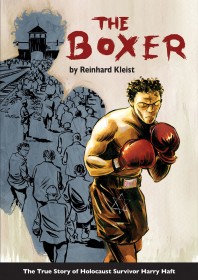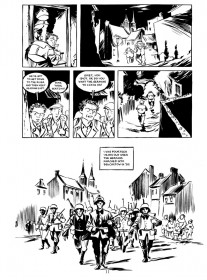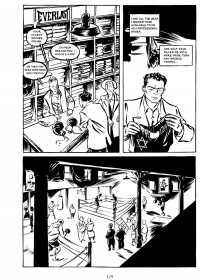Several of us at the Jewish Museum Berlin have observed that, over the last few years, the market for young adult literature has begun to demonstrate a growing interest in the subject of Nazism and the Holocaust. In the coming weeks, we will be introducing contemporary and classic works on this topic that we have read and discussed together.
What happened to the people who survived the concentration camps – what was life like afterwards? For their families, their children, the survivors themselves?
Alan Scott Haft’s father Hertzko Haft was a vicious and violent man, the polar opposite of what we would consider today to be a “good father.” Many years passed before Alan Scott Haft understood – and he didn’t really want to know – why his father was that way.
At some point he learned a little more:
“One of these days I’m going to tell you everything,” was the cryptic hint his father dropped during the only vacation the family ever went on together. It took another forty years for Hertzko Haft to actually tell his son everything: the story of his youth as the youngest of eight children in the Polish city of Belchatow, the German invasion, and the smuggling business his brothers got into to stay afloat.
Hertzko tells his son about his first girlfriend and fiancée, Leah. He describes the restrictions, the harassment, and the violent abuse that Jews were increasingly subjected to. Above all, he tells him about the period of time he spent in the concentration camp: he survived by boxing in brutal fights staged by the SS mostly between starving prisoners. When he learned after the liberation that Leah was living in America, he decided that he too should emigrate. He continued to box, and became famous. He wanted everyone to know that he had survived. Especially Leah.
Not to give away any more of the book, but we will just add that Hertzko Haft’s story is brutal and bloodcurdling. Alan Scott Haft wrote it down and published it in 2006 with the title “Harry Haft – Auschwitz Survivor, Challenger of Rocky Marciano.” The book came out in German in 2009 as “Eines Tages werde ich alles erzählen. Die Überlebensgeschichte des jüdischen Boxers Hertzko Haft.”
On the basis of Alan Scott Haft’s biography, Reinhard Kleist turned this unbelievable story into a graphic novel. His pictures – direct but nuanced – convey the violence, the brutality, and the despair.
The last pages of the book are dedicated to an essay by the sports journalist Martin Krauß, who writes about the boxers and fights in concentration camps and about Haft’s later life, with photos from his son’s personal collection.
“The Boxer” moved and impressed us in a way that few books on the subject of Nazis and the Holocaust have and we warmly recommend it to every willing reader over the age of 14.
PS: The jury of the German Young Adult Literature Prize was also taken with Reinhard Kleist’s graphic novel about Hertzko Haft and selected it as the best non-fiction book of 2013.
(You can read the jury’s statement here, in German.)
Nina Wilkens, education
Christine Marth, publications
Reinhard Kleist, The Boxer: The True Story of Holocaust Survivor Harry Haft
200 pages
London: SelfMadeHero 2014


